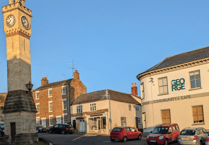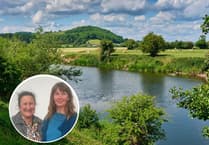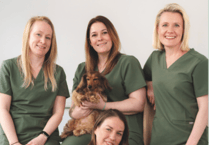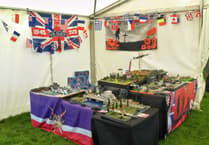AS a toddler Evie Gore would often complain of stomach pains and struggle to walk but, while obviously concerned, parents Sarah and Simon put the intermittent problems down to being “one of those things”
What nobody could even suspect was that they were symptoms of a condition that would need a world-wide search for a diagnosis and, eventually, a heart transplant.
Evie’s story starts just before her second birthday when the family lived in Norway.
Mum Sarah said: “ She would struggle to walk, she would have stomach pain.
“For years some times she would complain about this stomach pain so we didn’t really think anything of it.
“She had a dance teacher there and when she did high energy stuff, she’d get quite upset and say her stomach hurt.”
In 2018 Evie had an ultrasound scan on her stomach in a Norwegian hospital and two years later the family returned to live in Lydney.
The first sign of anything significantly wrong came in December 2020 when Evie had a fit.
She was given an outpatients’ appointment at Gloucester Hospital for two days later, Wednesday, December 16 but the following day was in extreme pain.
Paramedics couldn’t get a pulse from her finger and it was decided to leave it because of the hospital appointment the following day.
When they arrived at the hospital, Mrs Gore had to carry Evie in and she was immediately taken to a bed and her father was called in.
Mr Gore said: “They took me to the ward and half the ward was screened off with temporary screens.
“Evie’s on the bed with mum next to her with wires hanging out of her and 14 doctors around her.”
She then had her first cardiac arrest which lasted some 14 minutes and Evie’s life was saved by hospital staff.
Mrs Gore said: “They were exceptional, they got her back.”
A specialist heart team came from Bristol to prepare Evie to travel to the city for treatment which took four hours
Mrs Gore said: “It took them a long time because everything shut down, even finding a vein to get a main line in (was difficult)
“They didn’t know what they were dealing with at this point and she had to be externally paced.”
Seven-year-old Evie added: “My heart stopped beating and that’s when I got my pacemaker.”
Mrs Gore said; “The problem we now know is that she had restricted cardiomyopathy and thickening of the heart wall,
“It had stopped different parts of the heart talking to each other so her electronic signal was not operating.
“The relaxing and pumping of the heart are active processes, so it doesn’t relax properly so it won’t be filled with enough oxygenated blood.
“That is why any increased activity would create the stomach pain, it’s just one of those weird linked things.”
Confirmation that Evie had a restricted cardiomyopathy took a long time because it is unusual in children.
Cardiologist Ali Perry, who was one of the team that went to Gloucester, contacted hospitals around the world to try and get a steer on what exactly was wrong with Evie.
Mr Gore said: “They couldn’t find a similar case for the full six weeks we were in hospital.
‘‘Ali was in contact with hospitals all over the world and they had never seen anything similar.’’
The diagnosis of restricted cardiomyopathy would be confirmed two days before the end of that six-week stay in Bristol, the first half in paediatric intensive care and then the high dependency unit.
Mr Gore said: “We were warned about serious brain damage or death on the first night and that was before the second arrest, before the collapsed lung, before the kidney and liver issues.”
Mrs Gore said: “The first week on paediatric intensive care was incredibly intense while they were trying to figure out what it was
‘‘Obviously there were lots of tests and lots of inquiries – things were sent all over the world.
“They were hoping someone else had seen something similar that would give them some ideas.’’
But while Evie was in intensive care she had a second cardiac arrest, this time lasting 17 minutes.
It started while her father was reading her a story and the experience has left him traumatised.
Mrs Gore said: “The staff were absolutely outstanding and miraculously she went from being the sickest child on the ward to being ready to move before a lot of the other people we thought would move back to high dependency
“She was there for three weeks and in the words of one of our consultants said in his 20 year career it was the most miraculous recovery he had seen.”
Evie had a pacemaker with a single wire but that was not enough to stabilise the rhythm of her heart.
A pacemaker with two wires was needed but that created other problems.
Mrs Gore said: “Because of the condition of her heart, where they put that wire was not the ideal place, so she had on-going issues after that.
“It restricted her in terms of what she could do because they couldn’t risk that wire coming loose.
“It restricted her in what she could do at school or socially. She recovered really well but there was a lot of physio and she had to learn to walk again because she was so heavily sedated for those three weeks in intensive care.
“Her liver and kidney had to recuperate and she had a collapsed lung.
“It was a serious case of going to lose her several times but she came out like you’d never have known there was anything wrong.”
Mr Gore added: “When we were first admitted and they put in the temporary pacing wire, the surgeon said: ‘I see a lot of sick children and your child is very, very sick’ – and we were thinking: 24 hours ago she was running around.”
When Evie was eventually discharged one of the consultants, James Fraser described it as the most unique case he had seen and the most astounding recovery in his 20-year career, said Mr Gore.
Cardiologist Catherine Armstrong had been working on the theory that Evie had restricted cardiomyopathy and had been investigating the family’s wider medical history.
Mr Gore was put in touch with family he had never met and one told him that his great-grandmother had died aged 34 of an unknown heart condition.
He said: “She had never spoken about this and she opened up about this and gave all the information and went through death records to try and help a complete stranger which is absolutely incredible.”
DNA tests eventually confirmed the restricted cardiomyopathy thesis and then conversations started about a heart transplant.
Mrs Gore said: “They found a small DNA chain that has been linked to restricted cardiomyopathy in other places in the world
‘‘The pool of restricted cardiomyopathy of children her age even world wide is very small – it took them a while because there isn’t a lot to go on
“We then had a conversation where they said life expectancy with this was no more than five years and the next step is transplantation which is not a cure, it is palliative, it extends life.
“She (Ms Armstrong) was brilliant, she told us to get our letter into Great Ormand Street Hospital and get ourselves in that frame of mind.’’
Evie went onto the waiting list for a new heart in April 2021 and because there is no other treatment – and doctors were not sure what caused rapid deterioration – she was a high priority.
The call came at 8.52am on a Sunday, last autumn and Evie was taken by ambulance under blue lights from her home in Ruardean Woodside to London.
With the pacemaker, Evie appeared to be a “normal” young girl and it meant that she would go into surgery as strong as she could be.
There were four hours of tests on the donor heart but on the last one, doctors decided they were not happy with the function of it so cancelled the surgery.
The second call from Great Ormond Street came in the early hours one morning earlier this year – but that could also have been a near-miss.
The whole family caught Covid and Evie was taken off the transplant waiting list.
Mr Gore said: “If an organ had become available in that period it wouldn’t have gone to her.”
Mrs Gore said: “Because she hadn’t really been affected by the Covid at all and we had been in constant contact with them about how she was with it, they had made her part of their conversations the week before because she had been so well.’’
The call came three days before Evie should have gone back on the list.
They had bought a new landline because mobile reception in that part of the Forest is poor and two days after installing it, the call came.
Mrs Gore said: “They said the organ was as good as you can get and by 9.30pm that evening she was down in surgery.
“We were sent to a room to try and get some rest and I got a message in the early hours.”
Evie was back in intensive care by 2.30am with a new, slightly larger, heart.
Mr Gore said: ‘‘We expected her to be fully sedated for two days and we got there just before 6am and she was already waking up, having only got to the ward at 2.30am.
‘‘She was in hospital for three weeks and since being released has had regular monitoring but has not needed any further surgery.’’
Evie said: “I’ve got a bigger heart because a bigger child gave it to me but unfortunately that child had to pass away.’’
Her mum said: “We have to remember the wonderful gift.”
Mrs Gore said that while they quickly had to adapt to the “new reality”, both she and her husband had struggled at times in different ways.
She said: “Simon has PTSD (post traumatic stress disorder) from the second arrest which happened when he was reading her a bedtime story and the family has had to deal with that change in him as a person.
“Bristol and Great Ormond Street were great at offering psychology help and that is how you start to process things.
“You know the gravity of what has happened but your brain dulls it down enough to make it ordinary
“Even now there are things that fall by the wayside because you can’t think about everything.”
They are just grateful “to see her running around being Evie’’.
“It is traumatic but its not as traumatic as other parents whose children are constantly admitted for different surgeries.
“With Evie’s condition there weren’t lot of things they could do, there was one thing they could do — other children have to get as sick as they can get before they get the opportunity for transplant.
“In a way we were blessed by that double edged sword that that wasn’t her story. It is important to understand that it is not just really sick children who need these things.
“Evie tells people she has a new heart and people just wouldn’t know because she is so “ordinary” as a seven-year-old should be.”
Medical staff “become part of the family” and they also became very friendly with other parents of children in the paediatric intensive care unit.
Mrs Gore said: “They’ve seen us from that moment when we didn’t know how dire things were and now they see her as she is and that is their payment they say.”
Mr Gore said: “I kept saying thank you over and over again especially people like (cardiologists) Ali Perry, Graham Stuart and Catherine Armstrong and they said it was their job.
“Is thank you an adequate term for someone who is literally engineering miracles?”
Mr Gore said there are many other people who played a part whose names they do not know from ambulance drivers to play workers, the first response team at Gloucester and charities that provide accommodation near the hospitals.
There were also lots of people “sending good vibes”, praying and keeping Evie in their thoughts and Uncle James ‘Wokker’ Watkins.
He is a friend who drove 2,600 miles to send back some of their belongings which were still in their old house in Norway while Clouds Hill Records in Germany sent clothes and £500 worth of records.
They are also grateful to their employers, Mathern Day Nursery near Chepstow and Bristol-based creative production company Pytch “for really looking after us.”
Mrs Gore said: “We are blessed with the people around us. I also believe in a strong will and Evie is someone who possesses a soul that will not give in.”
The couple also plan to raise funds for the Ronald McDonald House in Bristol and the facility in London run by the Sick Children’s Trust.
Mr Gore said: “Unless you have a sick child where your child is in hospital for weeks, months or years on end its not the sort of thing parents have to think about – where are you going to stay especially if you live rurally.”
Mrs Gore said practical donations for the houses such as soap were also always welcome
They say their family’s experience has underlined the importance of organ donation.
Mr Gore said: “What we have here is a poster child for organ donation – you can go from being that sick to this well, it can happen.”





Comments
This article has no comments yet. Be the first to leave a comment.